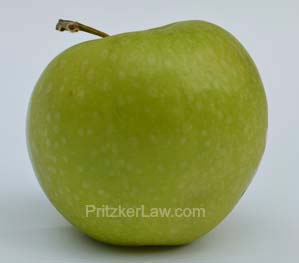There are several ways raw (unpasteurized) apple cider can be contaminated with E. coli:
- Farm or wild animals grazing in the orchard can leave behind E. coli-contaminated feces. Apples that fall to the ground can become contaminated. If even one contaminated apple is used to make raw apple cider, gallons of the finished product can carry this pathogenic bacteria.
- If cattle are grazing near the cider mill, manure can contaminate apples, equipment, or workers’ hands.
- If apples are transported or stored in areas that contain manure, the apples can become contaminated before processing. Again, one contaminated apple can contaminate many gallons of cider.
- Animal feces can get into rinsing water. If that happens and apples are rinsed with E. coli-contaminated water, the bacteria will get onto the apples and into the cider.
There have been outbreaks of illness caused by consumption of raw apple cider. Many of the people sickened in these outbreaks were children, some of whom developed hemolytic uremic syndrome.
In some of these outbreaks health officials have told families of the victims that they would need to hire an E. coli lawyer to get information from the state about the source of the outbreak. Our lawyers can help you file an E. coli lawsuit to get answers, compensation and justice.
The following is a press release issued by the Iowa Department of Agriculture:
Reduce Risk of E. coli from Apple Cider
AMES, Iowa — Cool fall weather puts many people in the mood for apple cider — and potentially at risk for E. coli, says Sam Beattie, an Iowa State University Extension food safety specialist.
“Unfortunately, new cider operations may not know of the risk of E. coli and food borne illness from raw apple cider,” Beattie said. “They may be handling their apples incorrectly and putting consumers at risk.”
Federal guidelines suggest a warning label on raw apple cider— cider that is not heat processed, Beattie said. “This type of cider may not be sold into retail commerce and may only be sold on the farm.”
Raw apple cider should not be served to at-risk populations, which include children younger than 9 years old, the food safety specialist stressed.
The following guidelines provide reasonable assurance of E. coli-free cider products.
• Apple cider should be made from whole, sound apples that have not been dropped or found on the ground.
• Cider presses and all equipment should be clean and sanitary before being used.
• All storage bottles should be clean and sanitary.
• Cider should be kept refrigerated at 40°F or cooler.
• Apple cider processors who heat treat must have an approved Hazard Analysis Critical Control Point (HACCP) plan in place.
“These measures greatly reduce the risk of transmitting illness from E. coli and other bacterial pathogens. Pasteurization, however, would reduce the risk to nearly zero,” Beattie said.
“Once apples — or any vegetables, for that matter — are contaminated, it is not possible to decontaminate them,” he added.

